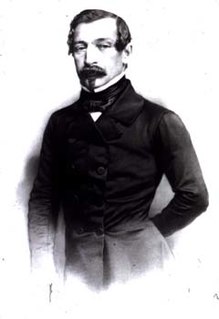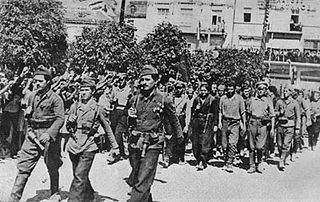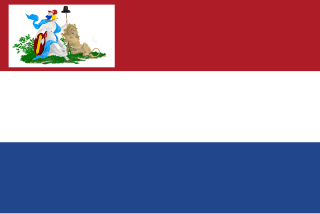Jean-François Reubell or Rewbell was a French lawyer, diplomat, and politician of the Revolution.

The Fourth Republic was the government of South Korea between 1972 and 1981, regulated by the Yusin Constitution adopted in October 1972 and confirmed in a referendum on 21 November 1972. From 1972 to 1979, power was monopolized by Park Chung Hee and his Democratic Republican Party under the highly centralized authoritarian "Yusin System". With the assassination of Park on 26 October 1979, the Republic entered a period of tumult and transition under the short-lived nominal presidency of Choi Kyu-hah, controlled under severe escalating martial law and witnessing the coup d'état of December Twelfth, the violent unfolding of the Gwangju Democratization Movement and its armed suppression, the coup d'état of May Seventeenth and presidency of Chun Doo-hwan, and finally the transition to the Fifth Republic under Chun in 1981.

Isaac Jan Alexander Gogel was the first minister of finance of the Batavian Republic and the Kingdom of Holland. He married Catharina van Hasselt in 1800, and had three children.
The Staatsbewind was a governing council of the Batavian Republic between 1801 and 1805. The presidents of the Staatsbewind were acting heads of state of the Batavian Republic.

The Uitvoerend Bewind was the name of the government of the Batavian Republic between 1798 and 1801. The president of the Uitvoerend Bewind was head of state of the Batavian Republic.

The National Assembly of the Batavian Republic was the Dutch parliament between 1796 and 1798. The National Assembly was founded in 1796 after general elections. It replaced the States-General of the Batavian Republic. The President of the National Assembly was head of state of the Batavian Republic between 1796 and 1798, during his term in office.

Rutger Jan Schimmelpenninck, Lord of Nyenhuis, Peckedam and Gellicum, was a Dutch jurist, ambassador and politician who served as Grand Pensionary of the Batavian Republic from 1805 to 1806.

The French coup d'état of 2 December 1851 was a self-coup staged by Prince Louis-Napoléon Bonaparte. It ended in the successful dissolution of the French National Assembly and the subsequent re-establishment of the French Empire the next year. When he faced the prospect of having to leave office in 1852, Louis-Napoléon staged the coup in order to stay in office and implement his reform programs; these included the restoration of universal male suffrage. His political measures, and the extension of his mandate for 10 years, were popularly endorsed by constitutional referendum. A mere year later, the Prince-President reclaimed his uncle's throne as Emperor of the French under the regnal name Napoleon III.

The history of the Hellenic Republic constitutes three discrete republican periods in the modern history of Greece: from 1822 until 1832; from 1924 until 1935; and from 1974 through to the present. See also the constitutional history of Greece.

The 1944 Bulgarian coup d'état, also known as the 9 September coup d'état was a forcible change in the Kingdom of Bulgaria's government carried out on the eve of 9 September 1944. It was called in pre-1989 Bulgaria People's Uprising of 9 September – on the grounds of the broad unrest, and Socialist Revolution – as it was a turning point politically and the beginning of radical reforms towards socialism.

The Constitution of 1961, officially titled the Constitution of the Republic of Turkey, was the fundamental law of Turkey from 1961 to 1982. It was introduced following the 1960 coup d'état, replacing the earlier Constitution of 1924. It was approved in a referendum held on 9 July 1961, with 61.7% of the nation voting in favor. It remained in force until the 1980 coup d'état, following which it was replaced by a new document, the Constitution of 1982, which remains in force today.

The Republic of Niger has had seven constitutions, two substantial constitutional revisions, and two periods of rule by decree since its independence from French colonial rule in 1960. The current "Seventh Republic" operates under the Constitution of 2010.
A referendum on the constitution of the Batavian Republic was held on August 8, 1797. The draft constitution was rejected, eventually culminating in a coup d'état.
Pierre Auguste Brahain Ducange was a French journalist, minor diplomat, secret agent, swindler, and author. He was the father of the French author Victor Henri Joseph Brahain Ducange. He played an important role in the coup d'état of 22 January 1798 in the Batavian Republic, by general Herman Willem Daendels, which brought the radical unitarist faction of Wybo Fijnje and Pieter Vreede to power, and he helped write the Staatsregeling voor het Bataafse Volk of 1798.
The 1999 Nigerien coup d'état occurred on 9 April 1999 and resulted in the death of President Ibrahim Baré Maïnassara and the installation of Daouda Malam Wanké as President on 11 April. Maïnassara was shot under unclear circumstances in an ambush at either Diori Hamani International Airport, potentially while attempting to flee the country, or at a military base, likely by members of the Presidential Guard.
A constitutional referendum was held in the Batavian Republic on 6 October 1801. After a previous referendum in 1798 resulted in a new constitution being approved, the French were not satisfied with this constitution, and under their influence a new constitution was written.

The current Constitution of Suriname was adopted on 30 September 1987, following a referendum. It marked the return to democracy after the Bouterse military dictatorship of the 1980s.

A constitutional referendum was held in the Batavian Republic on 16 October 1805. Although a new constitution had been approved in an 1801 referendums, the French authorities put pressure on the Batavian State Council to pass a new constitution in which executive power was held by a single person, the Grand pensionary, a post initially filled by Rutger Jan Schimmelpenninck. The new constitution had 87 articles, which provided for a 19-seat Parliament with a three-year term which could pass or reject bills, but not change them. It was approved by 99.96% of voters.

Carel de Vos van Steenwijk was a Dutch politician and diplomat.













